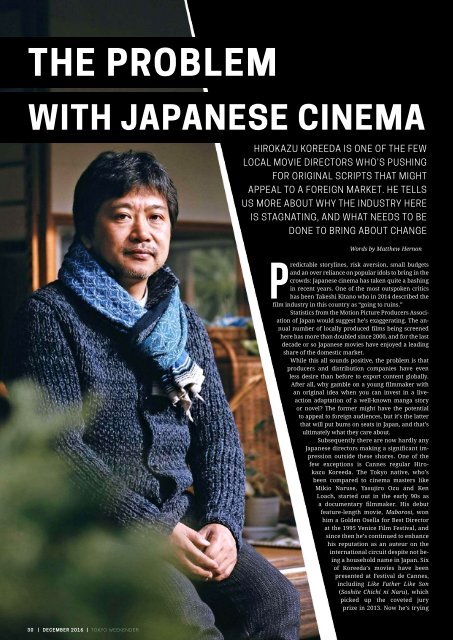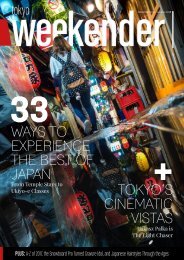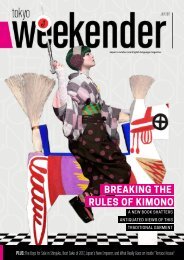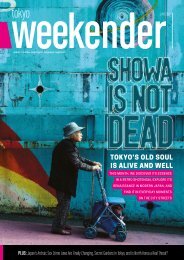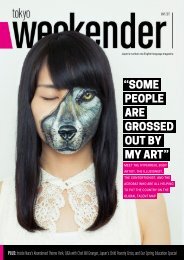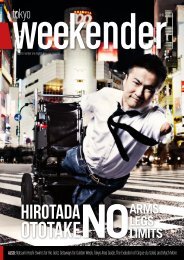Tokyo Weekender December 2016
2016's stranger things. Check out our review of the worst year in recent memory. Plus an exclusive Interview with Ryu Murakami, 31 Christmas Gift Ideas, and the Happy Bees on Ginza's Rooftops
2016's stranger things. Check out our review of the worst year in recent memory. Plus an exclusive Interview with Ryu Murakami, 31 Christmas Gift Ideas, and the Happy Bees on Ginza's Rooftops
Create successful ePaper yourself
Turn your PDF publications into a flip-book with our unique Google optimized e-Paper software.
THE PROBLEM<br />
WITH JAPANESE CINEMA<br />
HIROKAZU KOREEDA IS ONE OF THE FEW<br />
LOCAL MOVIE DIRECTORS WHO’S PUSHING<br />
FOR ORIGINAL SCRIPTS THAT MIGHT<br />
APPEAL TO A FOREIGN MARKET. HE TELLS<br />
US MORE ABOUT WHY THE INDUSTRY HERE<br />
IS STAGNATING, AND WHAT NEEDS TO BE<br />
DONE TO BRING ABOUT CHANGE<br />
Words by Matthew Hernon<br />
Predictable storylines, risk aversion, small budgets<br />
and an over reliance on popular idols to bring in the<br />
crowds: Japanese cinema has taken quite a bashing<br />
in recent years. One of the most outspoken critics<br />
has been Takeshi Kitano who in 2014 described the<br />
film industry in this country as “going to ruins.”<br />
Statistics from the Motion Picture Producers Association<br />
of Japan would suggest he’s exaggerating. The annual<br />
number of locally produced films being screened<br />
here has more than doubled since 2000, and for the last<br />
decade or so Japanese movies have enjoyed a leading<br />
share of the domestic market.<br />
While this all sounds positive, the problem is that<br />
producers and distribution companies have even<br />
less desire than before to export content globally.<br />
After all, why gamble on a young filmmaker with<br />
an original idea when you can invest in a liveaction<br />
adaptation of a well-known manga story<br />
or novel? The former might have the potential<br />
to appeal to foreign audiences, but it’s the latter<br />
that will put bums on seats in Japan, and that’s<br />
ultimately what they care about.<br />
Subsequently there are now hardly any<br />
Japanese directors making a significant impression<br />
outside these shores. One of the<br />
few exceptions is Cannes regular Hirokazu<br />
Koreeda. The <strong>Tokyo</strong> native, who’s<br />
been compared to cinema masters like<br />
Mikio Naruse, Yasujiro Ozu and Ken<br />
Loach, started out in the early 90s as<br />
a documentary filmmaker. His debut<br />
feature-length movie, Maborosi, won<br />
him a Golden Osella for Best Director<br />
at the 1995 Venice Film Festival, and<br />
since then he’s continued to enhance<br />
his reputation as an auteur on the<br />
international circuit despite not being<br />
a household name in Japan. Six<br />
of Koreeda’s movies have been<br />
presented at Festival de Cannes,<br />
including Like Father Like Son<br />
(Soshite Chichi ni Naru), which<br />
picked up the coveted jury<br />
prize in 2013. Now he’s trying<br />
30 | DECEMBER <strong>2016</strong> | TOKYO WEEKENDER


